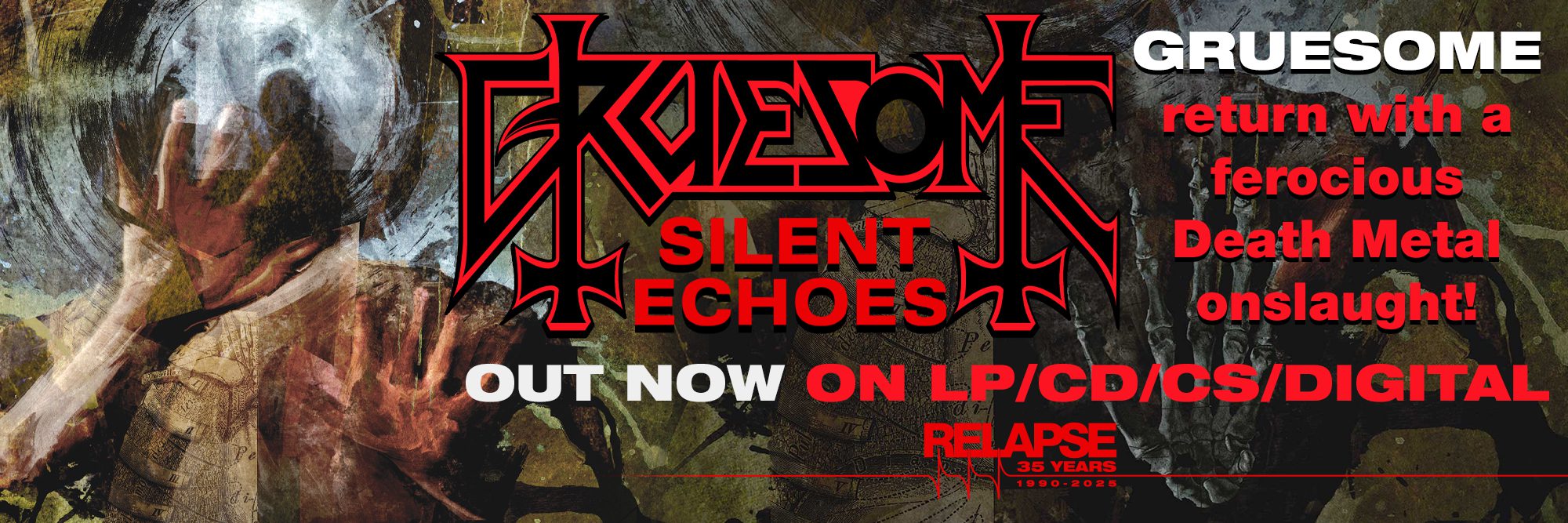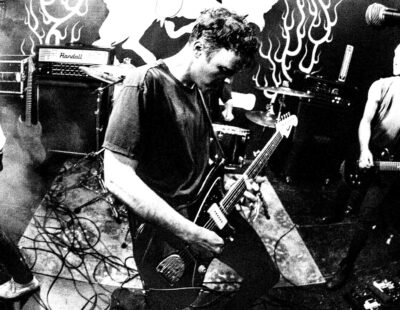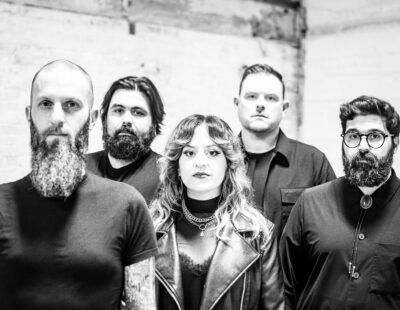Clocking in at 13 minutes or so, Retox’s debut rager Ugly Animals only just falls into the LP category. But, shit, it packs enough aggression, energy and compositional cordite to compensate anybody who is bummed out from holding out for a longer running time.
The San Diego quartet don’t fuck around—at least not with the message, nor their hyper-kinetic sound, a sound that spins at the outer limits of control on a well-oiled axis of punk/hardcore and is pocked by screams and freak-outs. Ugly Animals is exactly as fierce as you could expect of a band assembled from a quartet of individuals whose previous convictions include the Locust, Head Wound City, Holy Molar, All Leather, Some Girls, Swing Kids, Le Butcherettes, Cattle Decapitation, Struggle, The Festival of Dead Deer, and The Crimson Curse. There can be few drummers who can match Gabe Serbian beat for beat. But shit, collectively, Retox are in your face from the get-go.
Vocalist Justin Pearson is maybe best-known for serial audience ablating alongside Serbian in experimental noise/grind troupe the Locust. But shit, his work running 31G Records, as an author, and as a guy who since his teens has been involved in the underground, getting his hands dirty and shouting himself hoarse is every bit as compelling a back story.
The Deciblog fired some email questions to Pearson just as Retox were leveling dives in Europe.
Do you think punk/hardcore is just as democratic now, in terms of being able to pick up an instrument, with no recognisable prowess on it and make great music.
JP: I never thought it to be democratic. As cheesy as this may sound, something like punk or hardcore, an entity in life, or an art form, is not directly related to democracy. Sure, over time, with certain sub-genres, there has been “rules” placed on how things take place and develop (or not develop depending on how you look at it). But over all I think it’s more along the lines of Anarchy. However, not in the typical “I wear an anarchy t-shirt and hate authority,” but more so something like William Godwin, dating before the marketed mainstream anarchistic concept of our generation. I say this in relation to the question, mentioning people picking up an instrument. See, there are really no guidelines in my opinion. Some of the best artists created what they have done, or will do, with no proper education, and with no rules placed on them. I for one can’t read music, I was never properly trained, but I have managed to create art on my own terms. But I would also like to add that the terms used, such as punk and hardcore, are not only limited to music. I think my Mom, the way she lives, who she is, is punk. Granted she is not a fan of the music I create or what is labeled as punk, but she sure is a punk in my opinion. I say that with the out most respect. Therefore I see no democracy involved.
Indeed, but is underground punk/hardcore more democratic in the sense that you can get the message “out there”, on the Internet, social networking all that sort of thing?
JP: I think music is the most effective form of communication. It goes well beyond gender, race, age, class, etc. It does not rely on language or words. So that “message” is bound to travel no matter what sort of label you want to place on it. In relation to the Internet, I would not want to give that facet too much credit. Punk and hardcore existed well before the Internet and things seemed to function purposefully. In some way, the Internet seems to have watered things down, or has over saturated aspects of art or music. People tend to be a bit lazy or uninterested in this day. Maybe it’s some sort of cyber transition, where people can just sit at home, in front of a computer, download the music and watch it on YouTube. But to me, the real message can only be communicated in the moment. You can’t capture the essence if you are not there, as part of what is happening. But as far as democratic placement of music, I do still feel, Internet and social networking aside; it really comes down to the luck of the draw. It’s that on going debate as to what propels certain artists and not others. I’m sure we can all agree that mainstream has placed quite a few turds for the masses to devour. And at the same time, there are gems that lay underground that most people will never discover. Again, I see no democracy there. If anything, I see capitalism.
Is it tougher to fund tours now? The perceived wisdom is that it’s the touring that’s the salvation of the jobbing band, these days, album sales are down but everyone buys a shirt and a ticket for the show.
JP: My answer to this is I have always held onto some sort of “real” job ever since I started touring at the age of 15. For me, it was never profitable to tour and funding tours as you put it, never was something I could rely on. People don’t always buy shirts and pay for tickets to see a live act, especially in the current economy we are submerged in.
Do you see the current situation in the industry better for true art, as in the art for art’s sake?
JP: The industry for the most part has never been interested in true art, as you put it. I think the sheer fact that industry comes into play, tends to point towards corporate sponsorship, media placement, marketing ploys, and so on. I don’t want to criticize this by any means. People and artists can do what they want obviously, as can the industry. But I do feel that the industry never had real art in mind when making decisions. If that were a consideration, we would see people like Mick Barr, W.T. Nelson, Zach Hill, or Travis Ryan on a mainstream level, and winning Grammys.
Do you think that we’ll be looking at our record collections, seeing that it’s full of project bands who we’ll never see play a show?
JP: Maybe. I think the fact that anyone can just put out whatever they want and it be available sort of cheapens what people do end up releasing. There is no effort needed at this point, so what is stopping people from putting out anything and everything? But then again I know artists on a mainstream level who do this with their work.
Would that be a pity, if the project band would become the normal in underground music? Is punk rock still a medium that is at its most powerful when performed live?
JP: I think projects are relevant to some extent. I am guilty of this for sure. But as far as live vs. not live, I think it is important to see it live. With a live performance, you have the ability to see the sincerity, true musicianship, and the energy that is embodied in the material. But then again, you do have artists performing “live” with backing tracks and so on, but those acts tend to reach out beyond the “punk rock” label that you mentioned.
Does punk need to get more extreme to catch people’s attention, and is it harder to elicit shock to audiences now?
JP: I don’t think so. Most of the “shock rock” has covered all the extreme grounds. Anything from killing animals, to shitting on stage, to fighting people, it’s all been done before. As far as extreme musicianship, things have been fairly extreme up to this point. But as times passes, the bar gets raised here and there. But I don’t know that extreme is what is needed to get people’s attention. I would say sincerity, integrity, and creativity are what tend to grab my attention.
How thought out was Retox’s sound? Was there any explicit intentions on how you wanted it to sound or did that happen once you got into a rehearsal space?
JP: There was an initial idea that we wanted to head towards. Originally Gabe and I were talking about how we wished Head Wound City were more than an EP and one live show. We wished we could have done it full time. So I think that was the direction or at least a general starting point in what we wanted to do with Retox. However, given the players involved in Retox and time to develop, the sound for Retox has been evolving, or growing into its own skin. I do feel that if one sets out to do something too specific, they fall short and could easily miss out on finding the players’ true sound. I would rather things be more organic and less forced.
What was the writing process for Ugly Animals? For this kind of music, is it important not to overwork and overthink it?
JP: It really depends. Some aspects came together right away, and others took some time and a bit of tweaking. Over all, having confidence and control are key to developing anything musically. So there was no overthinking on our part, just the fact that we needed to find the right elements.
You guys have been big champions of local issue politics, would you ever run for office, on a local council level, at least?
JP: This is an interesting question. I can’t speak for the rest of the band, but for me, I have always been intrigued by certain artists who have run for office. A good friend of mine here in San Diego, Bob Barley, ran for mayor when I was younger. He aligned himself with Jello Biafra and Doc Corbin Dart, who are two vocalists that I really respect. So the idea of running for office seemed interesting to me. But I do think that, for me, I would fall way too left for me to obtain any sort of office and end up how Jello’s campaign ended. Plus, I think I have a record that might permit me from taking any sort of government job. I do feel that in the US, there is not a democracy. So that also would permit me from running.
Is two-minute punk song still a good format for a story, getting your point across and having people take note?
JP: I don’t think that looking at song writing, addressing songs to fit into a time-frame is a good idea. For me, and the artists who I have played with, we write and let the outcome feel itself out. Sometimes that might be 45 seconds and sometimes it might be 10 minutes. Ironically enough, as a vocalist, I tend to want to music to be perfect before I would even attempt to apply words to it. So if a track consists of a short burst of energy, say, fitting into the two-minute mark, fine. If it is a longer canvas, that works as well. I tend to focus on the beats, certain sounds, the energy, riffs, and so on… all of which influence the point I would like to get across.
What or who is exciting you in music/art at the moment?
JP: To name a few musicians and artists: Warsawwasraw, Doomsday Student, Neck Face, Ill saint M, Buraka Som Sistema, Nicole Wegner, Mike Crain, Schlag Schlag, Zeus, etc.
What have you got coming through 31G that people should check out?
JP: The new Secret Fun Club LP and the Warsawwasraw 7” single.
You’re doing some work with Invisible Children: what can you tell us about that, and indeed how can anyone who wants to help get involved?
JP: A good friend of mine in San Diego, Kenny Laubbacher, who works with IC approached me a few years back pertaining to doing some work with bands like the Locust and Some Girls. Of course I connected with him on a few levels and we started to work together on a few different projects over the years. If people want to get involved, I would suggest getting in touch with them through their website and linking up.
Retox Ugly Animals is out now through Ipecac and available on vinyl here and CD here.







